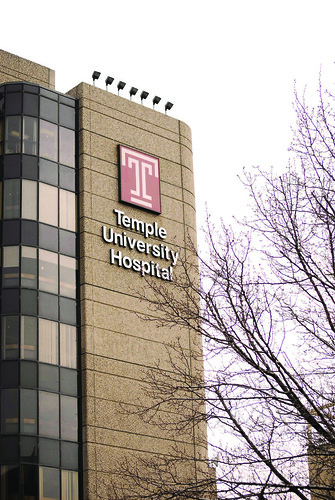Temple University Hospital has undergone significant losses during the past few years, the most recent of which is a $50 million dollar budget cut from Temple University Health System.

But Temple Hospital assures that medical students’ educations will not be undermined by budget concerns.
Edmond Notebaert, president and CEO of the health system and senior vice president of health sciences for Temple, said budget cuts and reductions will not affect the educations that medical students receive.
“The reductions in expenditures are targeted to improve patient care, reduce inefficiency and waste and fortify the excellent education our medical students receive,” Notebaert said.
However, medical students expressed concern about how the budget cuts will impact them.
Natalie Danielle Cosgrove, a second-year medical student at the School of Medicine, said she was not aware of the TUHS budget cuts, but she was aware the state was cutting its funding.
Cosgrove said she is worried about the effect of the cuts.
“Since I am only a second-year student, I have not been affected by this,” she said. “But with the patient population that Temple Hospital sees and the burden of recent economic challenges, I do worry about the financial stability of the hospital. Hearing that Temple is cutting the budget is alarming. I am concerned for the hospital’s ability to deliver care to its patients and its ability to afford a full staff.”
“Temple University Health System is experiencing a softening of patient volume, downward pressure on reimbursements to physicians and hospitals, increasing collection challenges and ever-escalating costs,” Notebaert said in a letter distributed to Health System and medical school employees. “More troubling, however, is that TUHS in recent years has become increasingly reliant on investment income, state grants and one-time asset sales to generate revenue to meet expenses.”
The letter also said the Health System has lost money on health care operations for five of the last six years. In 2008, TUHS lost $116 million on health care operations.
“Reliance on these one-time moves is not a sustainable strategy in the long term,” Notebaert said.
He added, in order for the Health System to continue to deliver patient care of the highest quality, TUHS will need to reduce expenses where appropriate.
“These initial expense reductions will help put the Health System on a more stable footing going forward,” Notebaert said in the letter. “While we can’t promise these will be the only reductions, we can promise that we will do whatever is necessary to ensure the viability of the Temple Health enterprise.
“Budget reduction efforts have been put in place in all of the Health System’s entities, starting with our non-hospital corporate operations but also targeting opportunities in our hospitals, physician practices and other operating units.”
Tamara Jette, a second-year medical student, said she is worried about the cost of tuition.
“As medical students, we worry that our already high tuition is going to be raised,” Jette said. “It doesn’t seem likely that they would take away from our medical education experience before they would raise our tuition, so I’m not concerned about a less educationally sound experience.”
In addition to budget cuts within TUHS, the state has cut funding to the Temple University Hospitals. The lack of state funding has contributed to the budget measures TUHS will be taking.
Notebaert said these reductions will not affect the quality of care or safety provided to patients, and the reduction in subsidies from the commonwealth will not affect medical students.
“The reduction in funding has required us to take a hard look at the services and programs we offer to the community,” he said. “While a reduction in state funding may challenge us to become a more efficient organization, it will not materially impact our educational mission.”
Notebaert outlined the measures hospital officials intend to take in response to the economic crisis.
“Right-size TUHS Corporate and reduce costs in the hospitals by $40 million to $50 million in order to reposition Temple Health for Fiscal Year 2010,” he said.
“We can provide health care services to the community in a fiscally responsible manner and reduce the length-of-stay at Temple University Hospital by using ‘best practice’ clinical pathways to improve outcomes and technological tools to improve communications,” he said.
The “clinical pathways,” Notebaert said, are meant to provide physicians and clinical staff with length of stay estimates for specific types of hospitalizations.
“These pathways map out daily goals and help medical staff evaluate a patient’s progress,” he said. “These tools will help us improve patient outcomes and enhance communication among all those responsible for the direct care of our patients.”
Despite her concerns, Cosgrove said she feels confident in her decision to study medicine at Temple.
“I believe this could happen anywhere,” she said. “Emory University School of Medicine’s main hospital, Grady Memorial, was dangerously close to closing last year for financial reasons, so I do not believe that other medical school hospitals would necessarily be ‘exempt’ from financial issues.”
Notebaert said the Temple hospital system is focused on continuing to provide health care services for the community.
“We are taking a hard look at operations at all our entities to evaluate how we can best meet the health care needs of the communities we serve,” he said. “That is – and will remain – our main focus.”
Valerie Rubinsky can be reached at valerie.rubinsky@temple.edu.



Part of the TUHS budget cut is the scaling back of their tuition reimbursement program for their employees and their employees kids. Meaning students who were planning on attending Temple in upcoming years will be out of luck and those already in the program will receive less aid. These are difficult times for Temple, hopefully Obama’s stimulus package will provide some support for Temple in the upcoming years.